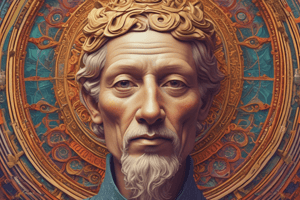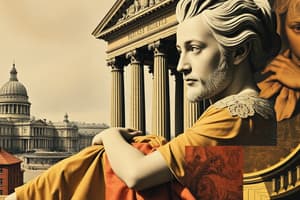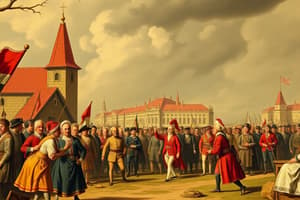Podcast
Questions and Answers
Wat was de intentie van Marcel Duchamp's Fountain in 1917?
Wat was de intentie van Marcel Duchamp's Fountain in 1917?
- Hij wilde de wereld laten zien dat kunstenaars geen invloed hebben op wat kunst is.
- Hij wilde de ideeën uitdagen over wat kunst is en wie het bepaalt. (correct)
- Hij wilde de wereld laten zien wat kunst is.
- Hij wilde de wereld laten zien dat kunstenaars geen autonomie hebben.
Welke kunstbewegingen zijn beïnvloed door Duchamp's werk?
Welke kunstbewegingen zijn beïnvloed door Duchamp's werk?
- Impressionisme en Expressionisme
- Renaissance en Barok
- Dadaïsme en Kubisme (correct)
- Romantiek en Realisme
Wat zijn de waarden van de Verlichting?
Wat zijn de waarden van de Verlichting?
- Superstitie, irrationaliteit en dogmatisme
- Geloof, mystiek en bijgeloof
- Rede, wetenschap en humanisme (correct)
- Bijgeloof, magie en religie
Welke groepen mensen zijn tegen de Verlichting?
Welke groepen mensen zijn tegen de Verlichting?
Wat heeft de Verlichting bijgedragen aan de samenleving en de kunstgeschiedenis?
Wat heeft de Verlichting bijgedragen aan de samenleving en de kunstgeschiedenis?
Wat stelt Pinker voor als een manier om de idealen van de Verlichting te verdedigen?
Wat stelt Pinker voor als een manier om de idealen van de Verlichting te verdedigen?
Wat is de 19e eeuw bekend als?
Wat is de 19e eeuw bekend als?
Flashcards are hidden until you start studying
Study Notes
- Marcel Duchamp's Fountain sparked a revolution in the art world in 1917.
- Duchamp wanted to challenge the idea of what art is and who decides it.
- He believed in the autonomy of the artist and their ability to determine what is art.
- Duchamp's work influenced movements such as Dadaism and Cubism.
- The 19th century is known as the Enlightenment, a time of autonomy, freedom, and modernity.
- Pinker's book discusses the history of the Enlightenment and its values of reason, science, and humanism.
- The Enlightenment led to a new way of thinking that shaped modern society and art history.
- People who oppose the Enlightenment include extremist populists, demagogues, religious fanatics, science deniers, and conservatives.
- Pinker suggests that defending the ideals of the Enlightenment can combat these opposing views.
- The Enlightenment has contributed to diversity and differences in thinking and doing.
Studying That Suits You
Use AI to generate personalized quizzes and flashcards to suit your learning preferences.




